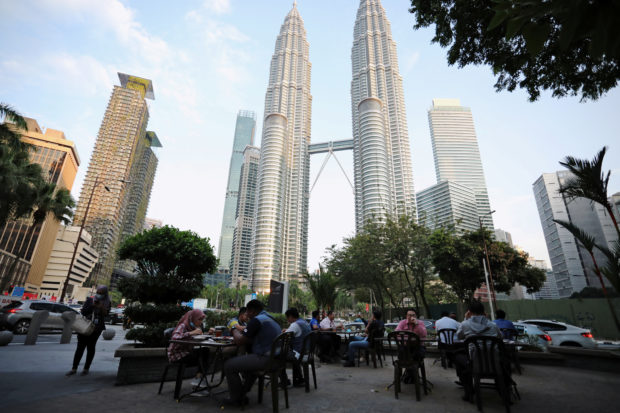Malaysian pump diesel sales drop 30% after subsidy cut

FILE PHOTO: People dine in at a restaurant in front of Petronas Twin Towers, in Kuala Lumpur, Malaysia November 5, 2020. Picture taken November 5, 2020. REUTERS/Lim Huey Teng
KUALA LUMPUR – Malaysia has seen a massive drop of 30 per cent in pump sales of diesel in the week after subsidies for the fuel were cut on June 10, in a clear sign that the subsidies borne by taxpayers had been abused for years.
While retail sales of diesel at refuelling stations dropped by eight million litres daily, the purchase of commercial diesel has risen by four million litres daily. Commercial diesel is sold at market price and meant for use at construction sites and plantations, as well as to power generator sets.
READ: Diesel prices jump 56% as Malaysia revamps decades-old fuel subsidies
“This gives an indication that some of the subsidised retail diesel have for long before this been used by industrial sectors that should have purchased at market prices. This trend… is a positive sign that leakages of diesel subsidies have shrunk,” Second Finance Minister Amir Hamzah Azizan told Parliament on June 24.
Prime Minister Anwar Ibrahim had said earlier in June that “the main goal of the diesel subsidy rationalisation policy is to ensure that subsidy wastage no longer continues, while ensuring that the savings are returned to the wider population”.
Datuk Seri Amir added that a fuel station near Malaysia’s border saw a wider drop of 40 per cent in diesel sales, “confirming that there was smuggling of diesel to neighbouring countries”.
“This is a retargeting of subsidies, not abolishment. Why should we subsidise Thai nationals?” the senator added.
The ministerial statement in Parliament on the government’s fuel subsidy rationalization plans – which will also include the base level RON95 petrol at a date yet to be announced – comes amid unhappiness among segments of the public and business sectors like tour buses that are now paying RM3.35 per liter instead of the previous rate of RM2.15, a hike of 56 per cent.
READ: Malaysia cuts diesel subsidies to curb spending
In a bid to cushion the inflationary impact of the price hike on over two million diesel vehicles, public transport, fisheries and the logistics sectors continue to enjoy a certain quota of subsidized diesel by using a fleet card.
Some 80 per cent of private persons and small-scale agriculture businesses using diesel vehicles – excluding the richest fifth of Malaysians – will also be given RM200 cash per month, which the government estimates will offset the additional cost of driving pick-up trucks like the Toyota Hilux and Ford Ranger for up to 75km per day.
Datuk Seri Anwar had said in May when announcing the diesel subsidy cuts that the move would save RM4 billion annually, more than a quarter of the RM14.3 billion spent in 2023.
But many, especially the opposition Perikatan Nasional, have focused on how Mr Anwar had constantly promised for decades before taking power in November 2022 to bring down fuel prices if he were to become premier.
Shadow finance minister Radzi Jidin responded to Mr Amir’s statement by pointing out how the government had also raised service tax rates from 6 per cent to 8 per cent in March and included new sectors to be levied, leaving many, especially those in agriculture, unable to take on the additional blow from higher diesel prices.
“This government is not listening to the people,” the Putrajaya MP said.
The price hike to RM3.35 per litre except in Sabah and Sarawak, where it remains at RM2.15, still allows Malaysians to enjoy cheaper diesel than in Thailand, Singapore and Indonesia.